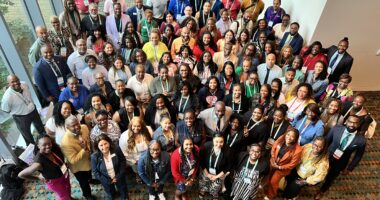Emotional Poverty in All Demographics
Session notes from "Emotional Poverty in All Demographics: How to Reduce Anger, Anxiety, and Violence in the Classroom," presented by Ruby Payne.
What was the speaker’s best quote?
“Genetics cocks the gun, but the environment pulls the trigger.”
What were the Top 5 ideas from the session?
- What is Emotional Poverty?
- Brain is unregulated and unintegrated.
- Attachment and bonding is not secure.
- External environment makes you feel “less than” and “separate from.”
- Inner self underdeveloped and dominated by deep hurts.
- Some emotional basics:
- All emotions are based on safety and belonging.
- Emotions are simple—you are either moving toward or away from something or someone.
- Emotions are fast about 200 – 5000 times faster than thought.
- It is hard to change behavior—it is fairly easy to change the motivation for the behavior.
- Your emotional self is highly structured by the time you are three and is restructured in adolescence after puberty.
- Your emotional self is structured before you have language so you act on information that you do not consciously know you have.
- You cannot change behavior you can’t name.
- It’s not possible for your brain to be both compassionate and angry at the same time. One is an approach emotion and the other is an attack emotion.
- The biggest different between desirable and undesirable behavior is compassion.
- A person who dies unexpectedly or early often plays more of an emotional role in a person’s’ life than then they were alive.
- Hand model of the brain based on D. J. Siegel, Mindsight
- The wrist is the spinal cord.
- Palm is the brain stem which is involuntary systems.
- Controls state of arousal: hunger, sexual, awake, asleep.
- The fight, flight, freeze responses: in survival mode, brain becomes reactive.
- Basis of “motivational systems” food, shelter, reproduction, and safety.
- Works with the limbic area to get you to act.
- The thumb is the limbic system of the brain.
- With your brain stem, creates emotions.
- Evaluates situation: Good or bad? Emotions the motions we chose (toward or away from) according to the meaning we assessing to the situation.
- Creates relationships and emotional attachments.
- Regulates the release of cortisol when we are stressed, which puts our entire system on alert.
- Can be sensitized and/or fragmented by trauma.
- Amygdala tends to be larger in brains from people from trauma.
- Hippocampus tends to be larger in people from educated households.
- The back of the hand and the fingers over the thumb are the cortex of the brain.
- Outer layer of the brain.
- Moves the brain to thoughts and ideas and creates its own representations.
- Allows thinking about thinking
- Prefrontal Cortex
- Sense of time and self
- Middle prefrontal region controls impulsivity, has insight and empathy, and enacts moral judgements.
- Prefrontal Cortex
- In your face explosion unintegrated, unregulated brain. What am I going to do about it and how can I handle it? What are some calming techniques?
- Water
- Future Story
- Tapping and Touching
- Look Up
- Breathing Techniques
- Pat Your Heart and Stomach
- Simplified EMDR Techniques
- Kaleidoscope Video
What is one strategy that you will implement immediately?
Your frequent flyers—students you see frequently for behavior or emotional issues are injured emotionally or psychologically. When an animal is injured, do you injure it again? We need to reimagine our discipline process.
What are some relevant or surprising stats you learned?
How many minutes does it take the blood to return to the brain after an episode? 25 – 30 minutes. Why do we try to process office referrals so quickly? Are we setting ourselves and the student up for failure?
Notes provided by Todd L. Brist, principal of Watertown Middle School in Watertown, South Dakota.




